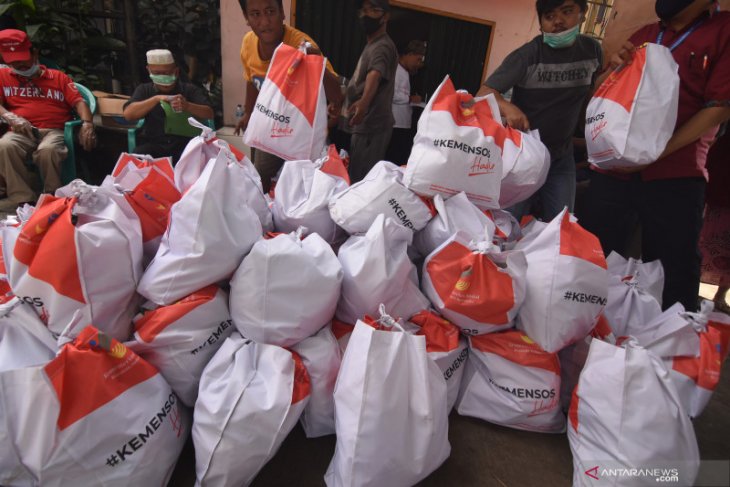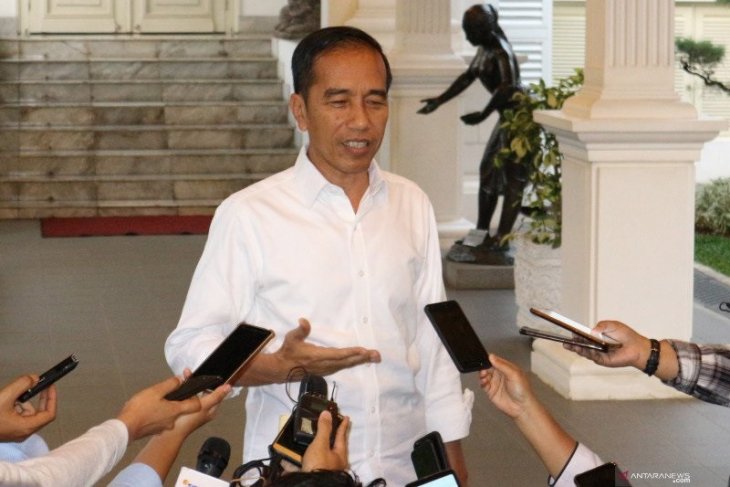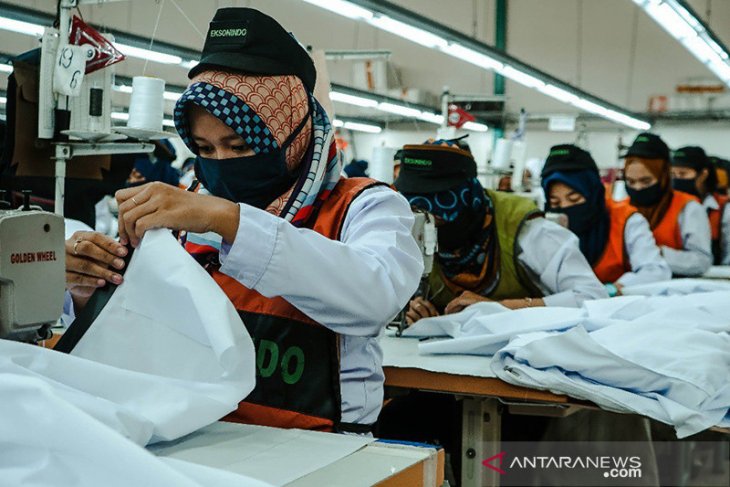Live Streaming
Program Highlight
Company Profile

Ani Hasanah
April

The Indonesian Government began distributing its aid packages to 1.2 million families in Jakarta currently suffering from the impact of the new coronavirus (COVID-19) outbreak on Monday (April 20, 2020). ANTARA PHOTO
The Indonesian government initiated the distribution of its aid packages to 1.2 million families in Jakarta currently bearing the brunt of the new coronavirus (COVID-19) outbreak on Monday.
Social Affairs Minister Juliari P. Batubara, on behalf of President Joko Widodo, symbolically handed over the staple food aid packages in front of the Merdeka Palace, Jakarta.
"What we are doing this morning aims to ensure the state's presence in handling the impact of COVID-19 on our affected people in Jakarta," he noted in a press statement during a videoconference.
Furthermore, the government will distribute similar aid packages to some 600 thousand affected families in the cities and districts of Bogor, Depok, Tangerang, Tangerang Selatan, and Bekasi, he revealed, adding that the aid packages will be offered for a three-month period.
The Social Affairs Ministry joined hands with several partners, including state-owned postal company PT Pos Indonesia, to distribute those aid packages to the families severely affected by this deadly virus.
"We are optimistic that the families in dire need will receive all the aid packages," Batubara noted.
The coronavirus disease initially struck the Chinese city of Wuhan at the end of 2019. Since then, it has spread to at least 202 countries and territories, including Indonesia, with a massive hike in the death toll.
This condition prompted the World Health Organization to declare it a global pandemic. Public health and economies in so many countries are reeling from the impact of the COVID-19 pandemic.
With COVID-19 infections spreading to all 34 provinces in Indonesia, President Jokowi has declared the coronavirus outbreak a national disaster.
In a bid to break the chains of this coronavirus transmission, several cities, district, and provincial governments in Indonesia have also imposed large-scale social restriction measures.
Among the cities currently enforcing the restriction policies are Jakarta, Bogor, Depok, and Bekasi in West Java; Makassar in South Sulawesi; and Pekanbaru in Riau.
As of Sunday (April 19), Indonesia had 6,575 confirmed cases, while the death toll from the virus had touched 582, whereas 686 patients received a discharge from hospitals.
Currently, there are at least 176,344 people under monitoring and 12,979 patients under surveillance in Indonesia’s 34 provinces. Jakarta remains Indonesia's COVID-19 epicenter, with the highest number of confirmed cases. (ANTARA)
April

President Joko Widodo. (ANTARA)
President Joko Widodo (Jokowi) has given clear-cut instructions to his aides to usher in improvements in the hospital reference system to handle overcapacity at some hospitals for tackling the COVID-19 pandemic.
"Improve the system of reference and the management of hospitals to handle overcapacity at our referral hospitals," Jokowi remarked at the Merdeka Palace in Jakarta on Monday.
The president made the statement at the virtual meeting on COVID-19 response in which the attendees comprised Vice President Ma'ruf Amin, cabinet ministers, and head of the Task Force for Acceleration of the COVID-19 Handling Doni Monardo.
"We should manage this carefully. We need to handle aspects pertaining to which patient is exhibiting mild and moderate symptoms and which ones are showing severe symptoms that necessitate intensive hospital care," he emphasized.
The government has readied 132 referral hospitals in 34 provinces for treating cases of coronavirus infection in accordance with Health Minister’s Decree No. HK.01.07/MENKES/169/2020 on referral hospitals for certain emerging infectious diseases.
It also readied Wisma Atlet (athlete village) in Kemayoran in Jakarta as an emergency hospital for treating patients with mild and moderate symptoms.
"I have also lauded the development of technology-based medical consultation, and I think this must be developed further. The number of telemedicine services must be increased, so it could reduce (physical) contact between patients and doctors," the president noted.
As of Sunday (April 19), the number of COVID-19 patients in Indonesia had reached 6,575. As many as 686 patients have recovered, while 582 others died of the virus.
The number of patients under surveillance (PDP) has reached 15,646, while the people under monitoring (ODP) stands at 178,883 people.
The coronavirus infection has spread to all 34 provinces across the country, with the highest number of confirmed cases recorded in Jakarta, reaching 3,052; followed by 696 in West Java; 590 in East Java; 370 in South Sulawesi; 349 in Central Java; 324 in Banten; 135 in Bali; 107 in Papua; 96 in South Kalimantan; 89 in South Sumatra; and 81 in North Sumatra.
According to the Worldometers website, as of Monday, 2,407,339 people worldwide have contracted the coronavirus. It also recorded 165,069 deaths owing to the virus and 625,127 patients having recovered. (ANTARA)
April

Indonesian workers were making personal protective equipment amid the COVID-19 outbreak. (Dok Humas PT Eigerindo Multi Pro)
The international rating agency Standard & Poor's (S&P) projects that Indonesia's economic growth will decrease to 1.8 percent this year due to the COVID-19 pandemic, before improving strongly in the next one or two years.
The government's decision to issue bold fiscal policy measures would help prevent long-term economic deterioration. Therefore, Indonesia's long-term economic growth rate was expected to remain well above the average peer country, according to the Bank Indonesia Communication Department in a written statement here on Sunday.
According to S&P, the superiority in terms of long-term economic performance indicates constructive economic dynamics in Indonesia.
On the external side, S&P considers that the rupiah exchange rate that depreciated sharply had a negative impact on the external sector and increased the cost of foreign debt so that it could affect the government's ability to pay its obligations.
Nevertheless, S&P believes that Indonesia can manage this risk considering that in recent years Indonesia has large and sustainable access to financial markets and foreign investment, even when the financial market situation is volatile.
S&P also believes that the flexibility of the rupiah exchange rate will benefit Indonesia's external competitiveness over the next few years and expand the space of the central bank in maintaining foreign exchange reserves.
S&P estimates that the rupiah exchange rate will gradually strengthen in line with the condition of global financial markets which will continue to be stable until the end of 2020.
On the fiscal side, an increase in the fiscal deficit will increase the amount of government debt in the next few years. However, the S&P understands that the increase in the deficit is the impact of extraordinary steps taken by the government in response to external shocks that are very unpredictable.
Strong fiscal support is needed to manage the public health crisis due to the widespread outbreak of COVID-19 and to mitigate its impact, both temporary and structural, on the Indonesian economy.
Specifically, the S&P highlighted the important role of Bank Indonesia in supporting efforts to maintain economic growth and mitigate economic and financial shocks.
A government regulation in lieu of law (Perppu) which was recently signed by President Joko Widodo, authorized Bank Indonesia to buy government securities on the primary market if market demand was deemed inadequate.
This can assist the government in managing loan costs when the financial markets are experiencing extreme disruption. Since the 2008 world financial crisis, many central banks in developed countries have also been given the same authority. Because this authority is only used when the financial market situation is under pressure, the impact on inflation and the exchange rate is relatively controlled.
In this regard, S&P acknowledged that with the independence support, Bank Indonesia was able to manage inflation at a level that was consistent with peer countries. (ANTARA)


